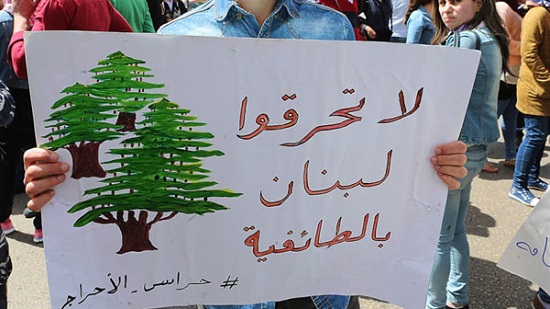In the streets and squares of Lebanon and Iraq, throngs of young people have been clamouring for sweeping reforms. They speak enthusiastically and passionately about the need to end the corruption and mismanagement that drove their countries to such dire economic straits, decaying public services and deteriorating standards of living.
Down with sectarianism
by Al Ahram
Opinion
00:11
Friday ,01 November 2019

Their anger is understandable. They feel that the negligence and abuse have reached such a magnitude that it is no longer possible to remain silent and that those responsible must be brought to justice. But what is particularly interesting in these latest mass protests is their call for an end to the denominational system of government in accordance with which political offices, parliamentary seats and other government posts are divvied up on the basis of set sectarian quotas. It is a system that gives religious leaders enormous clout in decision-making processes and shaping public policies.
Observers of Middle East affairs had long resigned themselves to the conviction that some countries in this region were doomed to denominational systems of government after so many years of civil warfare and ethnic and sectarian strife fed by outside interventions that capitalised on sectarian divides. But now we have a breath of fresh air!
The majority of the participants in the demonstrations in Lebanon and Iraq are from middle class backgrounds. In recent years, this class has been severely eroded by the effects of poor governance and the lack of transparency and accountability. From it come the new generations of young people who are most in touch with the outside world and among whom we find a growing shift from a consciousness shaped by sectarian allegiances to one that embraces the value of living in a society in which all members of society are equal in rights and duties. It is here that we find the impetus behind the demands to reorganise government in ways that make it more just and more effective by reducing the sectarian influences that foster exceptions to the rules and facilitate corruption.
The governments in Iraq and Lebanon have scrambled to announce reform packages and to take steps to fight corruption. Yet, something has changed in the general mentality of the people: they refuse to swallow the sedatives that are marketed in the name of reform. While such measures may have placated them in the past, people now realise that they do not address the sectarianism at the heart of the system which is the main impediment to any genuine process of political and economic reform.
Against the backdrop of current regional circumstances, there is no guarantee that the protest movements in Lebanon and Iraq will yield the results to which the majority of the people in these two countries aspire. A number of factors militate against that quintessential anti-sectarianism of their movement. Above all, it runs up against the powerful influence of pro-Iranian forces in both countries. The weight of these forces in the political equations of the Middle East is not to be underestimated and they will not easily relinquish the influence over decision making processes they acquired through denominational systems. They got where they are today thanks to deals they made with other parties, and they will continue to make whatever deals they can, regardless of the concessions or accommodations they have to make, in order preserve their influence.
The brightest aspect of the grassroots movements in Lebanon and Iraq is that they give hope to the possibility of ending medieval sectarianism and building modern societies based on the principles of equal citizenship, equal opportunity and merit.
Unfortunately, the authorities in these countries appear unable to keep pace with the new consciousness that is coalescing among broad segments of the people.
Governments might appeal to foreign powers for support to help them implement economic programmes to restore some vigour to the economy. But, this time, economic prescriptions from abroad will not suffice. What is needed is the ability to build a society from the ground up, politically, economically and socially, thereby building a consensus around a reform process acceptable to the majority of the people who now refuse to make concessions for little in return.
The grassroots movement against sectarianism breaks free of the many moulds and taboos that trap the Arab world in general, and Levantine societies in particular, into forms of socio-political organisation that make it possible for sectarian outlooks to suppress all desire for political reform, and that encourage the pursuit of narrow sectarian interests over the higher interests of a state that embraces all its people.
International media coverage of events in Iraq and Lebanon may have failed to grasp the profound change that has taken place in the general mood of two countries where sectarian strife has claimed hundreds of thousands of lives and caused so much misery. Ultimately what matters is that this grassroots movement appears able to impose its will thanks to the grit and resolve of the youth.


